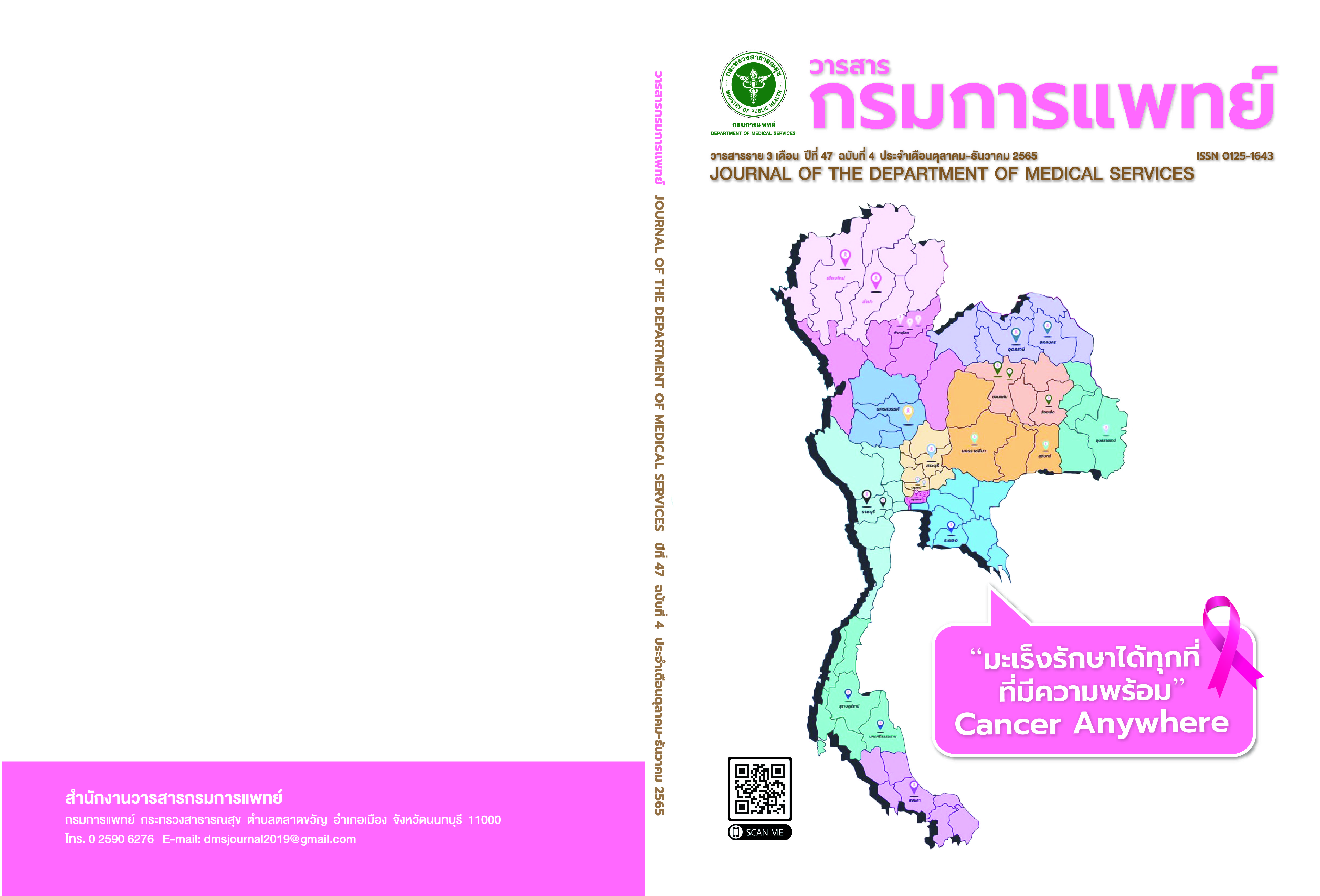Factors Affecting Health Literacy in Methamphetamine Addicted Patients: Addiction Services Center in Department of Medical Services Thailand
Keywords:
factors, health literacy, methamphetamine addicted patientsAbstract
Background: Drug problems affect people all over the world on an individual, family, socioeconomic, and nationallevels. If drug users can change their behavior by reducing or quitting drug use, they will achieve a better quality oflife. Health literacy as the main strategy of the Ministry of Public Health, can improve the quality of life of drug addicts.Professional nurses should have knowledge about the level of health literacy of drug addicts and factors that contributeto the the literacy development. They are inputs that enable patients to reduce or stop their drugusing drugs. Objective:This research aimed to study the level of health literacy and factors affecting health literacy in methamphetamine-addictedpatients. Methods: This study was a descriptive study which collected data from 507 samples at Princess Mother NationalInstitute on Drug Abuse Treatment and 6 Thanyarak Hospitals across the country. The date were collected using a healthliteracy questionnaire for methamphetamine patients created by the researcher based on the Sorensen concept. Theresearch tool was quality-examined by 3 experts with I-CVI = 0.8 – 1.0, S-CVI = 0.97, and Cronbach’s alpha coefficient =0.91. The date collection period was between April 25-June 15, 2022. Data were analyzed by number, percentage, mean,and standard deviation. The inferential analysis used multiple linear regression at the statistical significance level of .05. Results: Overall, patients had a moderate level of health literacy (mean ± SD = 72.8 ± 15.7). Education level, types ofdrugs used, gender, duration of drug used, and income determine the level of health literacy in methamphetaminepatients by 13.6% (R2 = 0.136) at a significant level of .05. Conclusion: The nursing team should create health literacyin patients by designing activities according to patients’ needs and associated factors such as level of education, typesof drugs, and gender.
References
World Drug Report. Executive summary policy implications.United Nations Offce on Drugs and Crime (UNODC); 2021. [cited2022 Feb 5].Available from: https://www.unodc.org/ unodc/en/data-and analysis/ awdr-2021_booklet1.html
Kanato M. and Et al. Report on the results of a household surveyto estimate the population of substance abusers in Thailand in2019. Bangkok: Charansanitwong Printing Co., Ltd; 2019.
Sukhararom R., Aiyawarakul T., Chokprajak S. and Nantiwatkul N.Supply and demand of drugs in Thailand and policyrecommendations Research report. Offce of the Research Fund;2015.
Veerachai V. A document describing the treatment andrehabilitation of drug addicts. Thanyarak Institute. Copy; 2014.
Sørensen, K., Van den Broucke, S., Fullam, J., Doyle, G., Pelikan, J.,Slonska, Z., & Band, H. Health Literacy and Plublic health: asystematic review and integration of defnitions and models. BMCpublic health; 2012. 12 (1), 80 doi:10.1186/1471-2458-12-80
Baker, D. W., J. A. Gazmararian, M. V. Williams, T. Scott, R. M.Parker, D. Green, J. Ren, and J. Peel. Functional health literacyand the risk of hospital admission among medicare managed careenrollees. American Journal of Public Health; 2002. 92(8):1278- 83.
Tayla J Degan, Peter J Kelly, Laura D Robinson and Frank P Deane.Health Literacy in substance disorder treatment: A latent profleanalysis. Journal of Substance abuse Treatment 2018; 96:46-52.
Akpin S., Saudan K., Thongchamnong L., and Zenchaowanit Y. HealthLiteracy of Thammasat University students on medical marijuanause. Documents for the meeting of the academic seminar on theoccasion of the 66th Anniversary of the establishment of theFaculty of Social Sciences, titled “Social Work and Social Welfare:Unlocking Inequality to Sustainability”; 2021 Aug 24; ThammasatUniversity. Bangkok: Thammasat University; 2021.
Kanchanawasee S. Selection of appropriate statistics for research.(4th printing). Bangkok: Boonsiri Printing; 2001.
Rolova G., Gavurova B., and Petruzelka B. Health Literacy,Self-Perceived Health, and Substance Use Behavior among YoungPeople with Alcohol and Substance Use Disorders. Int. J. Environ.Res. Public Health 2021; 18, 4337.
Rolová, G., Barták, M.; Rogalewicz, V.; Gavurová, B. Health literacyin People Undergoing Treatment for Alcohol Abuse—A PilotStudy. Kontakt 2018; 20: e394–e400.
American Psychiatric Association. Diagnostic and StatisticalManual of Mental Disorders (DSM-5). Fifth edition. AmericanPsychiatric Publishing. Washington DC; 2013.
Farrell, S.J.; Dunn, M.; Huff, J. Examining Health Literacy Levels inHomeless Persons and Vulnerably Housed Persons with MentalHealth Disorders. Commun. Ment. Health J. 2019, 56, 1–7.
Stacey L. Sheridan, David J. Halpern, Anthony J. Viera, Nancy D.Berkman, Katrina E. Donahue and Karen Crotty. Interventions forIndividuals with Low Health Literacy: A Systematic Review.Journal of Health Communication 2011. 16:sup3, 30-54, DOI:10.1080/10810730.2011.604391To link to this article: https://doi.org/10.10.
Downloads
Published
How to Cite
Issue
Section
License
Copyright (c) 2022 Department of Medical Services, Ministry of Public Health

This work is licensed under a Creative Commons Attribution-NonCommercial-NoDerivatives 4.0 International License.
บทความที่ได้รับการตีพิมพ์เป็นลิขสิทธิ์ของกรมการแพทย์ กระทรวงสาธารณสุข
ข้อความและข้อคิดเห็นต่างๆ เป็นของผู้เขียนบทความ ไม่ใช่ความเห็นของกองบรรณาธิการหรือของวารสารกรมการแพทย์



